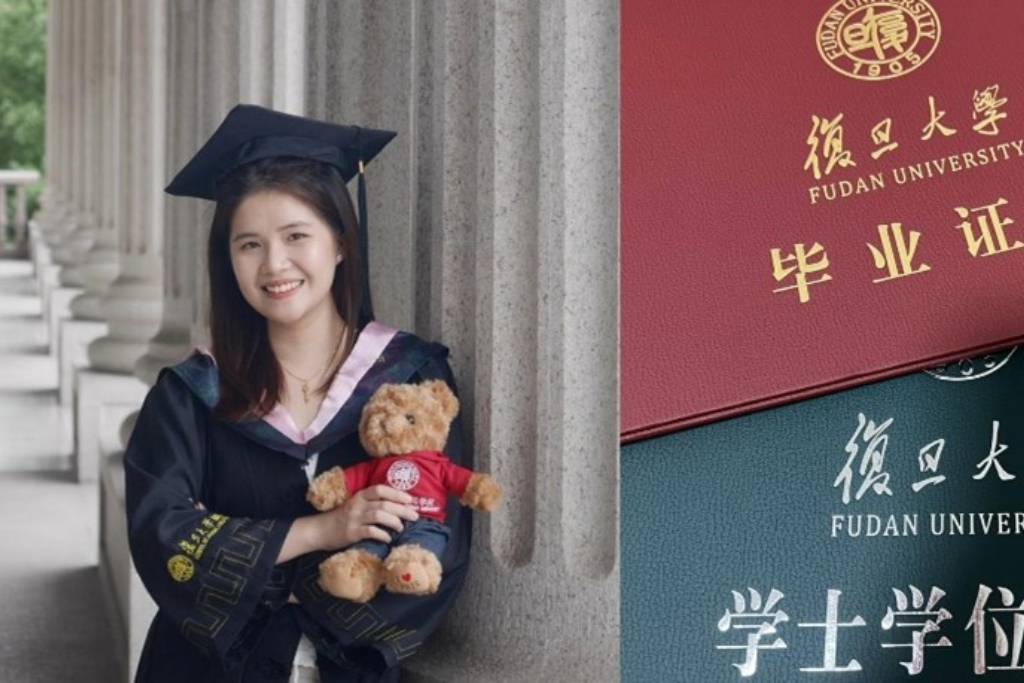2025 is giving 1900s energy with the slow death of free speech. It’s a troubling reality for journalists or anyone pursuing a journalism degree today.
Call it dramatic but it’s true.
When Disney’s Beauty and the Beast hit theatres in Malaysia, a brief same-sex dance scene was all it took for censors to push back. In the US, books are vanishing from shelves just for talking about race or LGBTQ+ issues.
Welcome to the new censorship era, where fear trumps facts.
Censorship in China is on another level. Ever heard of the Tiananmen Square massacre? No? The government made sure of that.
So, imagine choosing to study a journalism degree in China. That’s exactly what Jia Jun Hau, from Malaysia, did.

Outside of her journalism degree, Hau joined the “Foreigners in Fudan” competition. Source: Jia Jun Hau
What’s it like studying a journalism degree in China?
Hau enrolled in the journalism degree at Fudan University in Shanghai. The programme leaned heavily on theory and group assignments, but classroom discussions were minimal.
“If a professor asked if anyone had questions, no one would say a word,” she explains. “Students only speak when they’re absolutely sure they’re right. They don’t see being challenged as a good thing.”
It’s a very different learning environment from Western classrooms that encourage creativity and critical thinking. Even for Hau, who had received a Chinese education her whole life.
The storyteller who hated writing
Hau spent her early years at a Sekolah Jenis Kebangsaan (Cina) (SJKC), a national-type Chinese primary school in Malaysia and her secondary studies at Kuen Cheng High School, a Chinese Independent School.
Her education has been distinctly Chinese.
She was the kind of student who was always on stage: emceeing school concerts, anniversaries, and sports days. She loved creating content and writing scripts.
“It’s just fun to share something you’re interested in or something that’s useful for others in school.”
With that kind of passion, you’d think she’d go straight into broadcasting. But while Hau loves storytelling, she admits that writing isn’t her strong suit.
“Writing is my least favourite thing,” she says. “But I knew I needed to learn to write in order to be a good storyteller.”

One of the things Hau loves most about studying her journalism degree abroad is getting to see the seasons change — something she doesn’t get to experience in Malaysia. Spring is her favourite! Source: Jia Jun Hau
A journalism student’s reality in China
When Hau was accepted into Fudan University’s journalism degree, she was beyond excited. The school’s ranking alone made her feel like she was stepping into something big.
It is the oldest institution for journalism and communication education in China, earning the reputation of Fudan Journalism School, Home to Journalists Worldwide.
But once classes began, things weren’t quite what she had pictured.
In principle, journalism is about the truth: to report breaking stories, tackle controversial subjects, and hold power to account.
But in China, that mission is hard to live up to.
The country ranks among the top nations in imprisoning journalists.
The government’s hold on information is firm, supported by one of the most advanced censorship systems in the world: the “Great Firewall.”
This environment makes it hard to report freely — even as a student. Many silence themselves, shying away from anything that might attract the wrong kind of attention.
Despite these challenges, supportive professors still exist.
In Hau’s “Depth Reporting” class, she was taught by an ex-BBC reporter. He had a very Western style of teaching and encouraged students to explore any subject they felt passionate about.
“That was really mind-blowing for me,” she recalls. “I’ve been at Fudan for years, and I’ve never had a professor like him.”
Motivated by his encouragement, Hau wrote about a topic that is close to her heart: insomnia among college students.
It was honest, relatable, and well received. Hau’s proud she walked away from the class with an A minus.

Hau won third place in the student-run “Foreigners in Fudan” short video contest. It was a fun and meaningful experience telling stories through the lens. Source: Jia Jun Hau
Writing under watch
Despite the professor’s efforts to promote independent thinking, many students didn’t welcome his teaching style.
With a schedule packed with nine demanding courses a week, Fudan journalism students had little energy left for thought-provoking assignments.
“I think it’s going to take a long time for people to really break through the restrictions,” Hau explains. “Most just want to finish their degree. They’re not motivated to challenge mainstream narratives or produce impactful journalism.”
This reality made her reconsider her path. “Why am I pursuing a journalism degree in China?” she asked herself.
It would have been better to go to a Western or more liberal country, somewhere she could write more freely and explore more topics.
Still, Hau found a silver lining to studying her journalism degree in China.
“I get to see things differently,” she says, “because I’m inside a country shaped by a unique political and economic journey over the last 10 to 20 years.”
It’s the kind of perspective she believes you can only get by being there.
As an international student, she experienced fewer restrictions too. But it was a privilege her Chinese classmates did not have.
“It’s unfortunate. You can tell Chinese students have a lot they want to say,” she observes, “but they’re worried. They have to think twice about every word and how they frame their ideas.”

